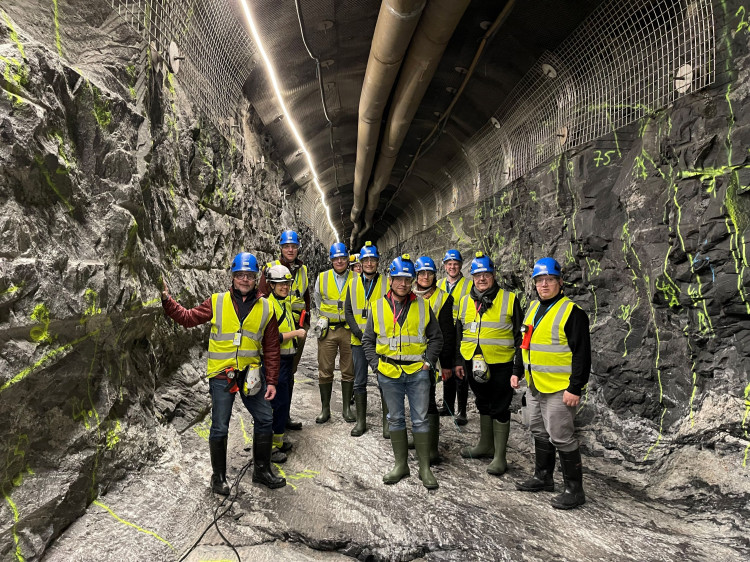An International Atomic Energy Agency (IAEA) team of experts said that Finland is committed to the safe, secure, and sustainable management of radioactive waste as it nears completion of the world’s first geological disposal facility for spent fuel. The team also emphasized the need to reduce complexities in Finland’s legal and regulatory framework when revising its Nuclear Energy Act.
The Integrated Review Service for Radioactive Waste and Spent Fuel Management, Decommissioning and Remediation (ARTEMIS) team today concluded a twelve-day mission to Finland. The mission was carried out at the request of the Government of Finland and hosted by the Ministry of Economic Affairs and Employment of Finland (MEAE), which is responsible for nuclear energy use and the related issues.
The review team, which comprised experts from Belgium, France, Germany, Italy, Slovenia, Switzerland, the United Kingdom and the United States, as well as three IAEA staff members, held meetings with officials from the MEAE, the Ministry of Social Affairs and Health, and the Radiation and Nuclear Safety Authority. The team also met with Fortum Heat and Power Oy (the Finnish state-owned energy company), the Teollisuuden Voima Oyj nuclear power company, Posiva Oy (developer of the geological disposal facility for spent fuel), the VTT Technical Research Centre, and the University of Helsinki. The review mission was attended by an observer from the European Commission.
ARTEMIS reviews provide independent expert advice from an international team of specialists convened by the IAEA to evaluate the national framework and programme for the safe management of radioactive waste. Reviews are based on the IAEA Safety Standards and technical publications, as well as international good practices.
During the mission, the team visited the ONKALO geological disposal facility for spent fuel – the world’s first ever such facility. This repository - scheduled to be operational around 2025– is built at Olkiluoto, on the south-west coast of Finland, near the site of one of the country’s two nuclear power plants. The team observed the ongoing preparations that will lead to a fully operational geological disposal facility at the site.
“Finland is effectively implementing their national strategy including developing a geological disposal facility for spent fuel, which would be the first of a kind facility when taken in operation,” said review team leader John Tappert, Director, Division of Risk Analysis, Office of Nuclear Regulatory Research at the U.S. Nuclear Regulatory Commission. “This peer review, by independent international experts, is a timely reconfirmation of Finland’s commitment to a safe and effective radioactive waste and spent fuel management programme.”
Finland’s two operating nuclear power plants supplied roughly one third of the country’s electricity in 2021. In addition to the progress at ONKALO, Finland also manages and disposes of low- and intermediate-level waste from the operation of its nuclear power plants, has effectively planned for future decommissioning, and safely manages waste generated from the use of radiation sources in medical and industrial applications. The review team noted Finland’s clear strategy to meet its climate change goals which includes the safe management of radioactive waste in a manner that will protect the environment and future generations.
“With particular reference to ONKALO, which is planned to provide for the final step in spent fuel management, Finland is to be congratulated for its safe radioactive waste management programme and for seeking continuous improvement through the ARTEMIS review process”. said Anna Clark, Head of IAEA’s Waste and Environmental Safety Section.
To maintain and further enhance the safe and responsible management of radioactive waste and spent fuel in Finland, the team made several recommendations and suggestions to the Government including:
- The Government should consider improving consistency of the legislation to reduce the complexity of regulation and management of all radioactive waste.
- The Government should consider continuously evaluating the suitability of the current policy and strategy for radioactive waste and spent fuel management against the anticipated future demands of the Finnish Climate and Energy Strategy.
- The Government should consider assessing resources to govern the national programme on radioactive waste and spent fuel management in Finland and considering the need for redundancy in competence.
Liisa Heikinheimo, Deputy Director General, Energy Department of the Ministry of Economic Affairs and Employment said, “The ARTEMIS peer review was conducted by a highly experienced international team. The outcome of the review supports our national spent fuel and radioactive waste management solutions and provides some valuable suggestions for the future. The review is especially important for our progress with the first operating license for Posiva’s spent nuclear fuel repository at ONKALO.”
The final mission report will be provided to the Government of Finland in around two months.
About ARTEMIS
ARTEMIS is an integrated expert review service for radioactive waste and spent fuel management, decommissioning and remediation programmes. This service is intended for facility operators and organizations responsible for radioactive waste management, as well as for regulators, national policy makers and other decision makers.
The IAEA Safety Standards provide a robust framework of fundamental principles, requirements, and guidance to ensure safety. They reflect an international consensus and serve as a global reference for protecting people and the environment from the harmful effects of ionizing radiation. IAEA documents such as Nuclear Energy Series publications are also included in the review basis. They include practical examples to be used by owners and operators of utilities, implementing organizations, academia, and government officials in Member States, among others.


